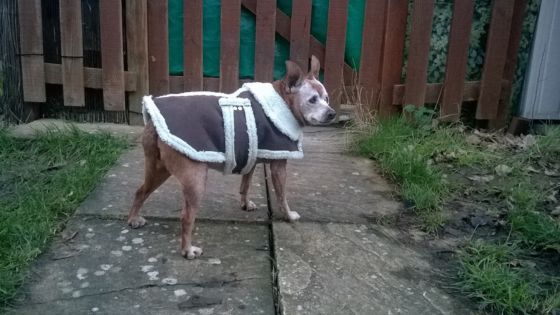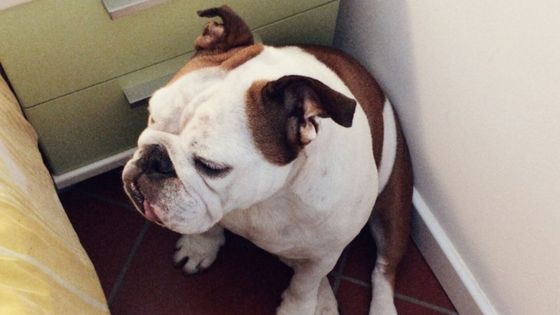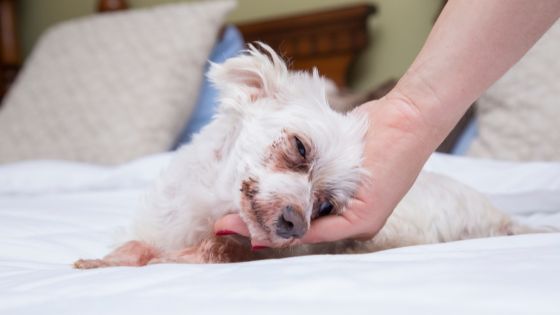It’s a pretty common problem to see senior dogs waking up in the middle of the night, or spending their nights pacing and restless. Not only is it rough on our dogs, it’s also rough on us when we lose sleep, affecting mood and the ability to function well.
There are several reasons why your senior dog is restless at night. He or she may be in some pain or discomfort due to an illness or joint problems, a medical condition or medication is causing excessive peeing, or cognitive issues like dementia are responsible.
*There are affiliate links in this post, which means if you make a purchase I may receive a small commission. This has no effect on the price you pay.*
Why Your Senior Dog is Restless at Night
Before we get into the reasons and what you can do to help, I want to ask if your dog has been to the vet recently for a check-up? If he has, I’m assuming any medical condition has been diagnosed, and a treatment plan put forward. If that’s the case, the restlessness is likely continuing because the medication hasn’t taken effect yet.
If it’s been a while, the first thing I suggest you do is book an appointment. If you have to wait a week or two, why not ask if you can drop off a urine sample in the meantime? They can check it in house, or may choose to send it away for a more in-depth analysis.
A few reasons why your dog is restless at night:
♦ Kidney disease, diabetes, Cushing’s and urinary tract infections are just a few health challenges that can cause an increase in the need to pee. That is certainly a good reason to explain the inability to settle.
♦ The pain associated with arthritis, other joint issues and even some diseases such as cancer can make it difficult for your dog to get comfortable for extended periods.
♦ Your dog is experiencing something called “sundowning” which means they start getting agitated as night approaches. Because their sleep/wake cycle is disturbed, you may notice your dog sleeping all day, but wandering all night. This is due to Canine Cognitive Dysfunction (CCD) or dementia.
Kidney Disease, Diabetes etc…
If your dog has been diagnosed with an illness that causes an increase in the need to pee, and you haven’t seen any improvement in how restless he is at night, have another conversation with your vet. Sometimes it takes awhile to find the right medication or dosage so a review may be needed.
Arthritis, Joint problems….
It’s perfectly understandable how difficult it can be to settle when a dog is experiencing pain. I wrote an article about pain relief in dogs with arthritis, but the information will help with other conditions as well. Jot down some of the suggestions you’re interested in trying and have a chat with your vet. “5 Effective Ways to Reduce Pain in Dogs with Arthritis.”
Dementia

This picture is of my heart dog Red (RIP) who had dementia.
This section will be the most in depth for a few reasons:
- It’s extremely common
- Dementia is not diagnosed through a blood or urine test as other illnesses are so is often not diagnosed
- Many vets don’t think of dementia
- Treatment options aren’t always mentioned by the vet
Here are a few articles I wrote about dementia, but there’s tons of helpful info in this article just keep reading!
A Comprehensive Guide to Dog Dementia
Does Your Senior Dog Have Dementia
My Life as a Dog with Dementia
Signs Your Dog Has Dementia
Anxiety
- Cries/barks for no reason
- Seems afraid/anxious when he never was before
- Exhibits aggressive behavior for the first time
- Afraid of people he knows
Disorientation
- Stares at walls or into space
- Pacing back and forth
- Lost in familiar places like the house or backyard
- Doesn’t seem to understand commands
- Gets stuck in corners, behind furniture or doors
- Trouble eating/keeping food in his mouth
Housetraining
- Comes back in from a walk, then pees and poops in the house
- Doesn’t let you know he has to go out like he used to
Sleep/awake patterns
- Sleeps more during the day, less at night
- Wanders or cries at night
Interaction with household members
- Withdrawn
- Doesn’t like to be petted or cuddled
- No longer greets people when they come home, or is less enthusiastic
Activity level
- Doesn’t play much or at all
- Not as interested in walks

What Causes Dementia in Dogs?
Some vets are sure of the causes, others less so, but after a bit of digging this is what I discovered.
- Lesions in the brain destroy healthy brain tissue and cause deterioration in how your dog thinks, learns and remembers.
- Genetics
- Free radical damage which harm healthy cells in the brain
- Decreased dopamine production
- Not enough blood getting to the brain
- Brain tumor or brain trauma
It’s unlikely you will know the cause, but that won’t affect your ability to help your dog cope.
How is Dementia in Dogs Diagnosed?
Since there is no test, it is done through a process of elimination. This is because many of the signs are also present in other illnesses.
Bring a list of the behaviors you’ve noticed recently to your vet appointment, and make sure your vet does blood and urine tests (unless you’ve already dropped off a urine sample). If they’re all negative and no medical explanation can be found, by process of elimination your vet will likely determine it to be dementia.
How to Treat Dementia in Dogs
Those of us who have/had a dog with dementia, go to the ends of the earth to find some relief for their anxiety.
There is one prescription medication called Anipryl (U.S. and Canada) and Selgian (UK). In my experience, and from what I’ve read from other senior dog parents, vets don’t always mention it because they don’t think it helps enough dogs. The way I see it is, it doesn’t have to help every dog, it just has to help yours…and it helped my dog Red quite a bit.
Below you will find a few treatment suggestions. For a comprehensive list, I suggest you check out this article⇒ “22 Natural Ways to Calm Your Anxious Dog”
NOTE: Please speak with your vet before trying something new.
NOTE: What works for one dog, may not work for yours.
NOTE: You’ll find it’s often a combination that leads to the best success, so be ready for some trial and error.
CBD Oil
Not all are created equal, so choose a brand that’s been third party tested. Here are a few recommendations from members of my Senior Dog Care Club FB group:
- NuLeaf
- Ellevet
- Innovet
- American Shaman
- Pet Releaf
- Lazarus Naturals
Alprazolam (better known as Xanax)
Typically used to treat panic disorders due to things like fireworks or thunderstorms, many vets have recommended Xanax to treat the anxiety associated with dementia in dogs.
Senilife
A supplement that contains a combination of antioxidants to help reduce brain-aging behaviors. Please visit their website for more information. If you would like to purchase on Amazon
Thundershirt
A dog calming vest designed to apply gentle, constant pressure to calm all types of anxiety. Visit their website to learn more. Purchase on Amazon or Chewy.

Melatonin
Many dogs with dementia experience something called “sundowning,” which means they start getting agitated as night approaches. Because their sleep/wake cycle is disturbed, you may notice your dog sleeping all day, but wandering all night. Melatonin may help restore that cycle.
SAM-e (S-adenosylmethionine)
Typically prescribed for liver support, it is now also used for dogs with dementia. To learn more, this article is worth reading – “What Can SAM-e Do for Dogs?”
Trazadone
Available by prescription from your vet, it is an antidepressant used to treat anxiety in dogs.
Ginkgo Biloba
Made from the leaves of a tree native to China, it contains powerful antioxidants that improve brain function and circulation. If you’d like more information, please read the following:
“Ginkgo“
Fluoxetine (Prozac)
Fluoxetine, better known as Prozac, is an antidepressant used to treat depression and sometimes OCD in humans. Many senior dog parents I know have been prescribed Prozac for their dogs’ anxiety, with much success. For more information about how this product can help your dog, please read the following: “How Fluoxetine Treats A Number Of Behavioral Issues In Animals.”
Omega-3 Fatty Acids
Not found naturally in the dog or human body, omega 3 has many important benefits including the possibility of improving cognitive function in older dogs. If you’d like to learn more about omega 3, and the benefits it can provide your dog, please read the following:
“Nutrition and the aging brain of dogs and cats”
Here are two, senior dog parent, highly recommended products:
TerraMax Pro Premium Liquid Omega-3 Fish Oil
Rescue Remedy Pet
A blend of 5 Bach Flower Remedies, it helps calm stressed and anxious dogs. It’s always good to read up on products you’re considering buying, so here’s some information from their website.
Night light
Believe it or not, this is a trick many senior dog parents use and they have found it helps their dogs settle and sleep better.
Adaptil
Adaptil mimics dog appeasing pheromones in a plug in, spray or collar.
Hill’s Prescription Diet b/d
According to their website, this food has been clinically proven to help maintain learning ability, social interaction and sleep patterns in older dogs.
Purina Bright Mind Adult 7+
According the Purina website, “with enhanced botanical oils shown to promote alertness and mental sharpness in dogs ages 7 and older within 30 days.” Some members of my FB group have seen positive results after switching their dogs to this diet. Buy on Amazon.
Through a Dog’s Ear

Bioacoustically engineered music, proven to help calm anxious dogs. This was a game changer for me in dealing with my dog Red’s dementia. There were days when she would circle endlessly and the only way I could get her to stop was to put her on the couch with me. Somehow I discovered this music on YT and I’m not exaggerating when I say, within less than a minute of playing it she would be resting. If you’d like to learn more about how this music works to calm anxious dogs, this will be of interest. You can find a 13 minute sampler on YT, as well as tons of other calming music. The picture above is the one we used.
Acupuncture
Many senior dog parents in my FB group take their dogs for regular acupuncture sessions. Reasons vary, some for arthritis and other joint issues, and some for overall well being. In an informal poll I conducted of 432 members, 74% reported a reduction in dementia related anxiety. The article below may be of interest, and there are links to help you find a qualified and experienced vet who does acupuncture.
“Acupuncture as an Auxiliary Treatment of Dementia/Cognitive Dysfunction in Geriatric Dog.”
International Veterinary Acupuncture Society (IVAS)
Association of British Veterinary Acupuncturists (ABVA)

Living With a Dog with Dementia
As someone who lived with a dog with dementia for 2 ½ years, I can say the most important thing is to be patient and understanding. Here are some other tips I’ve learned.
- Don’t rearrange your furniture, keep things as familiar as possible
- Dogs with dementia wander or walk in circles, so keep floors clutter free
- Engage in play time
- Comfort her when she needs it
- Don’t overwhelm her with too much “new” stuff – people, toys…
- If you don’t have a schedule, create one for feeding, walking and bedtime. Structure is good for all dogs, but can be particularly beneficial for anxious/confused dogs.
- Keep commands short and simple
- If it’s too hard to let your dog sleep in your room, set her up on a nice cozy bed in another room. You may all sleep better.
- If you’re planning a vacation, bring her along. A motor home or caravan is a great dog friendly way to travel, or stay in a pet friendly hotel. Can’t bring her with you? Find someone you completely trust to care for her in your home, as the familiar will be more comforting.
Is your dog restless? Did it come on suddenly, or have you been noticing subtle changes over time? Have you been able to discover the cause, and how are you helping? Sharing helps others, so please leave your helpful tips below.
If you’re looking for a community of senior dog parents, a place where you can find helpful tips, support and people who “get it” please join my FB group Senior Dog Care Club
I help senior dog parents struggling with anticipatory grief and quality of life issues by offering practical tips, advice and one on one support. I am also a Certified Pet Loss Grief Support Coach, helping you navigate through your pet loss journey.
Visit my services page to book a FREE 20 minute discovery call, or email me (Hindy) at hpearson141@gmail.com if you have any questions.
I’ve been rescuing and caring for senior dogs since 2009. From vision and hearing loss to obesity, dementia, kidney disease, liver issues, cardiac problems, Cushing’s, mobility challenges and more, you could say I’ve dealt with and learned a lot! In addition to my hands on experience, I’ve taken many courses and earned several qualifications to keep learning how to help senior dogs and they include: Senior Dog Enrichment, Understanding Canine Anxiety, Care of the Senior Pet and I’m a Certified Pet Loss Specialist.

